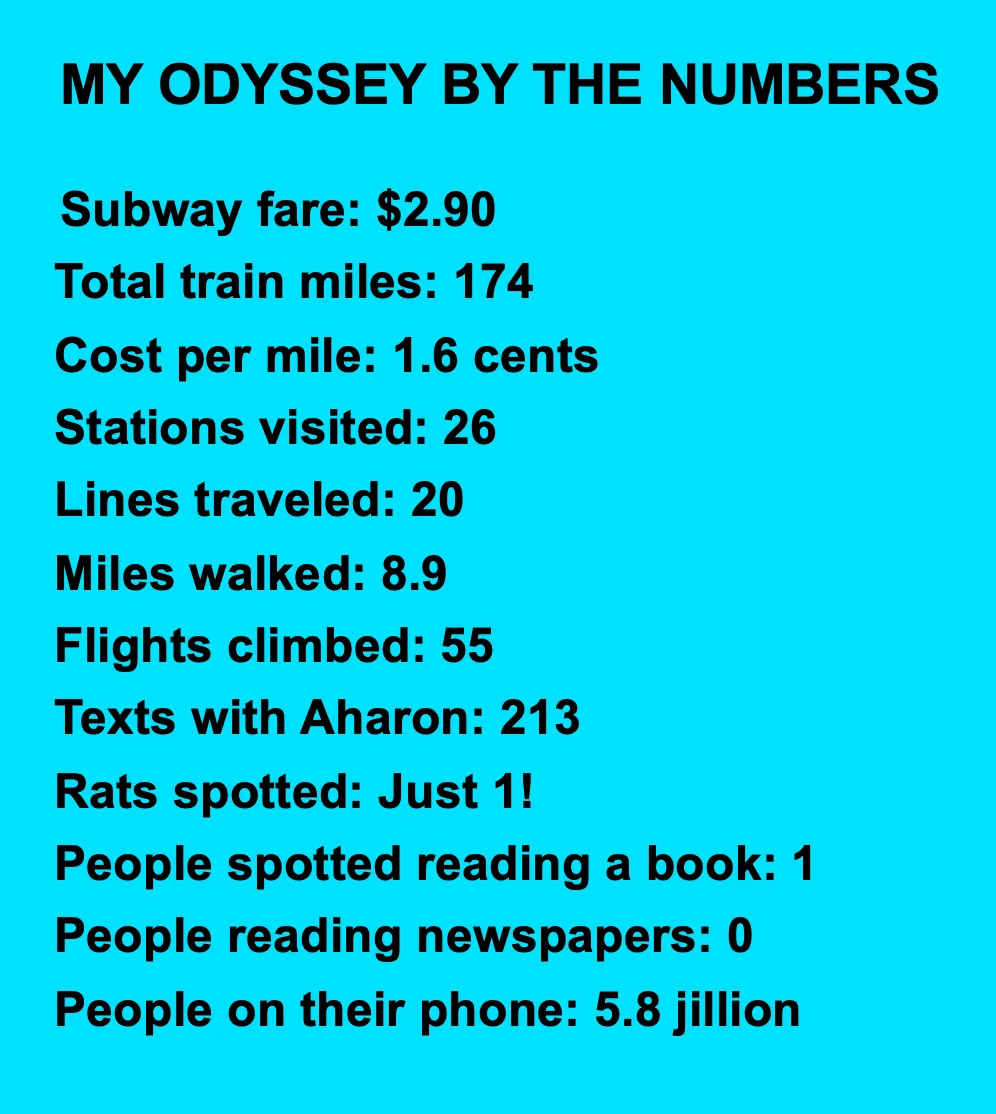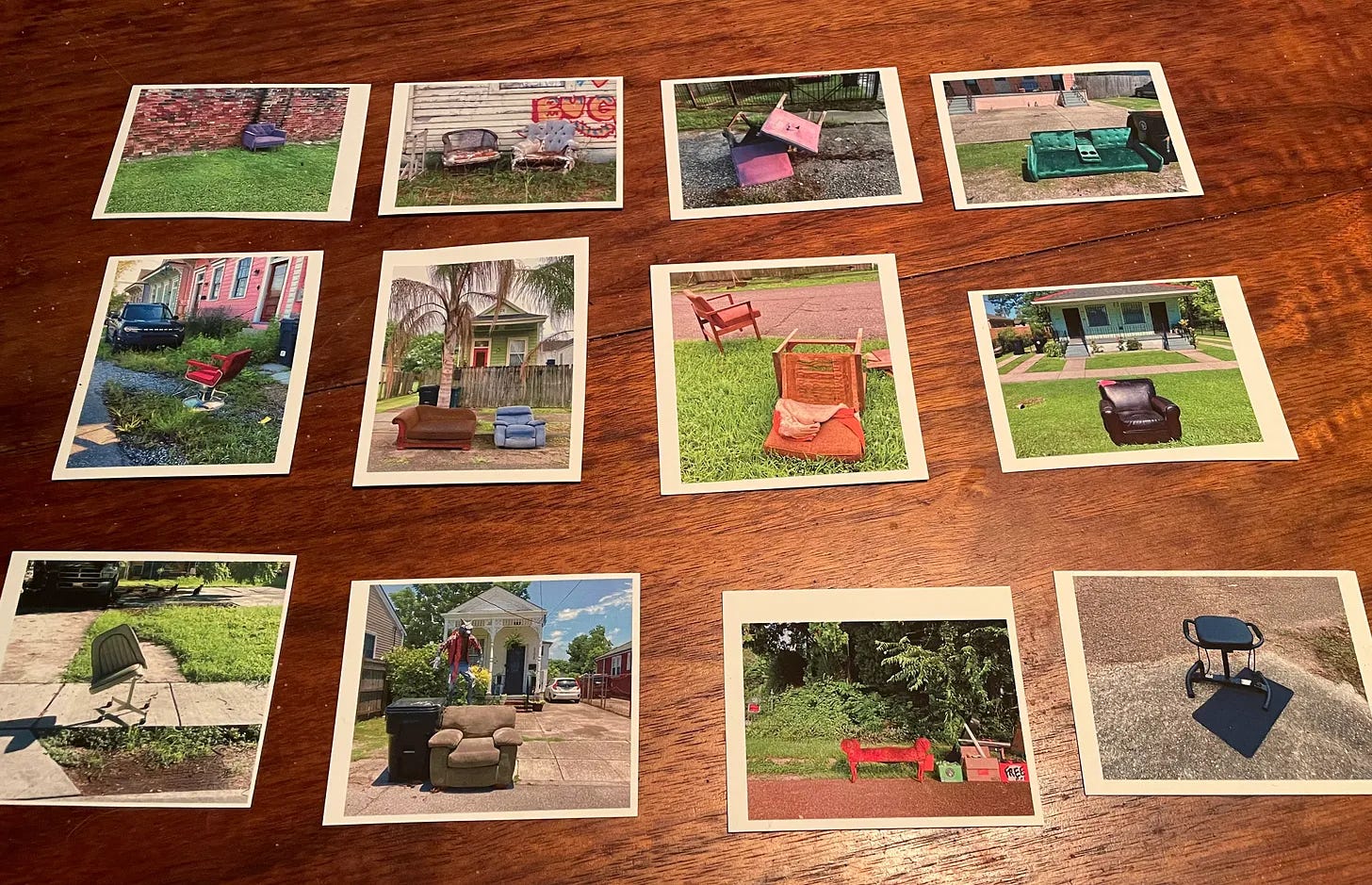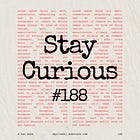📚 Getting started with AI, Warren Buffet on succession planning, 24 Hours on the NYC subway! A cartoonist’s advice, Why libraries need librarians
Reciprocity & regifting, Neighborhood calendar challenge, The big wait and Rocket engine fireplace
Hello, this is post #189.
Just two weeks left until the new year—2024 really flew by! At the start of this year, I had big plans for personal and professional growth. While not everything turned out as I envisioned, I’m not complaining. For every missed goal, there were unexpected wins, especially in the time I got to spend with family and friends. Honestly, that’s left me in a really good place.
What do I expect from 2025? I’m not sure yet. Maybe the next couple of weeks will get me into the right mindset to reflect and set some goals. Let’s see where the inspiration takes me!
I am optimizing for warmth & comfort this month. You will feel it in today’s curation…
It’s the season to feel all the joy, don’t wait up? Let's go…
🤖 Getting Started with AI
Ethan Mollick stands out as one of the most curious and thoughtful voices in the world of AI. He doesn’t just explore these tools—he experiments, refines his understanding, and, like a great teacher, breaks it all down into simple lessons for his audience.
When he wrote about getting started with AI, I had to dive in. He’s not offering hacks or mastery secrets, just practical prompting techniques to help you get tasks done or collaborate with AI to think through problems.
His hands-on approach shines through in every idea he shares, making his insights incredibly valuable for anyone curious about exploring AI.
For instance, he suggests a smarter way to define AI's role as your copilot in workflows.
Treat AI like an infinitely patient new coworker who forgets everything you tell them each new conversation, one that comes highly recommended but whose actual abilities are not that clear. And I mean literally treat AI just like an infinitely patient new coworker who forgets everything you tell them each new conversation. Two parts of this are analogous to working with humans (being new on the job and being a coworker) and two of them are very alien (forgetting everything and being infinitely patient). We should start with where AIs are closest to humans, because that is the key to good-enough prompting.
Or how AI can become a tool to enhance your thinking, sparking ideas, and offering perspectives you might not have considered.
Even if the AI advice isn’t that helpful, you can use it as a rubber duck - the popular idea in computer programming that, if you explain an issue to an inanimate rubber duck on your desk, you will work through the problem on your own by talking it out. As one example, I spoke to a quantum physicist who said AI helped him with physics. When I asked him whether or not the AI was a good physicist, he said it wasn’t, but it was curious and pushed him to think through his own ideas. The rubber duck at work.
It's a short, straightforward read—no big promises, just practical tips that make meaningful improvements.
💰 Warren Buffet on Succession Planning
Last month, Warren Buffett shared his will and succession plan in a letter to Berkshire Hathaway shareholders. Most of his fortune is already pledged to charity, but his reflections go beyond wealth. It’s not the usual topic for this newsletter, but his insights were deeply thought-provoking.
Here are a few highlights, though I recommend reading the full letter to truly appreciate his perspective.
When Susie died, her estate was roughly $3 billion, with about 96% of this sum going to our foundation. Additionally, she left $10 million to each of our three children, the first large gift we had given to any of them. These bequests reflected our belief that hugely wealthy parents should leave their children enough so they can do anything but not enough that they can do nothing.
and…
I have one further suggestion for all parents, whether they are of modest or staggering wealth. When your children are mature, have them read your will before you sign it.
Be sure each child understands both the logic for your decisions and the responsibilities they will encounter upon your death. If any have questions or suggestions, listen carefully and adopt those found sensible. You don’t want your children asking “Why?” in respect to testamentary decisions when you are no longer able to respond.
(via Sunday Snippets by Sarthak Ahuja)
Two of my favorite discoveries this year are Anne Kadet’s CAFÉ ANNE and Rob Walker’s Art of Noticing.
Anne takes us on quirky adventures through New York City, finding delight in the everyday and sharing stories of people who live life their own way. Her curiosity leads her to experiences that most would find bizarre but somehow turn into compelling, heartwarming reads.
🚇 24 Hours on the NYC Subway!
In one of her recent posts, she talks of when she spent 24 hours straight on the NYC subway! Her day was a whirlwind of hopping between trains, hunting for churros, catching platform performances, and talking to strangers. She observed the full spectrum of human life—from artists and commuters to people finding rest on the platform.
Anne has a gift for noticing the overlooked. Through her storytelling and photos, she reveals moments that most of us miss. Her work feels like a reminder to slow down, pay attention, and really see the world around us.
Here’s a breakdown of her 24-hour subway adventure in numbers:
When it comes to noticing, Rob Walker is truly a master of turning the ordinary into something extraordinary. His book The Art of Noticing and accompanying substack are treasure troves for anyone curious about finding significance in life’s overlooked details. His belief that no emotion is too small and no detail unworthy of attention resonates deeply—it’s a refreshing perspective in a fast-paced world.
📆 Neighborhood Calendar Challenge
In a recent post, he shared his The Neighborhood Calendar Challenge, a deceptively simple idea that encourages us to notice and capture the hidden gems around us. It’s a task that might seem silly at first, but it opens your eyes to the beauty and quirks of your everyday environment. Here’s what he worked on this year: “The year in discarded seating.”
He shares a brief note on how to go about this challenge:
Over the next few months, take occasional pictures around your neighborhood, with an eye toward compiling enough (12) for a calendar. [This can be a good summer project to involve kids in, I’d venture.]
Potential parameters:
Maybe the images you compile are (like my J.C. calendar) a series of personal landmarks — sites you would miss if you moved.
Maybe you want to narrow it to a category: flowers, architectural details, birds, trees, even just a particular color, anything you want.
Maybe you want to pair up this exercise with the “single-object scavenger hunt” I describe in the book: document all the interesting mailboxes or fence ornaments or store banners or the backs-of-stop-signs or whatever it is — good, bad, indifferent-but-interesting — that you have noticed recurs through your neighborhood.
You get the drift. The concept invites you to appreciate the little things in life, turning them into something meaningful. It’s simple, fun, and surprisingly rewarding.
I’ve taken random photos before, but never with this kind of deliberate focus. I think I’ll give it a try—it sounds like a lot of fun!
If you’ve to pick this challenge, what would you like to notice?
🐅 A Cartoonist’s Advice
Zen Pencils' “A Cartoonist’s Advice” feels like a warm cup of hot cocoa for the soul. It’s a heartfelt tribute to Bill Watterson, done with such honesty. My favorite part of the comic perfectly captures the spirit of creativity and staying true to yourself.
I discovered Calvin and Hobbes during college and have been a huge fan ever since. Calvin’s boundless imagination is endlessly inspiring—he crafts his own world to chase every spark of curiosity that excites him. And Hobbes? He’s the friend who makes everything better, a constant source of comfort. Everyone deserves a Hobbes in their life. And if you don’t have one? Well, you can always create one—just like Calvin does.
📚 Why Libraries Need Librarians
Most of us don’t really know how libraries function, especially public ones, or why librarians are so essential. In her piece “What do librarians do?”, Constance Grady dives into the behind-the-scenes magic of libraries and the vital role librarians play in keeping them alive.
She highlights that public librarians wear many hats—they’re coders, social workers, and book-recommendation wizards all rolled into one. They’re the backbone of these temples of knowledge, ensuring they remain free and accessible to everyone.
One part of her insights really stuck with me.
Perhaps on a subconscious level, we tend to undervalue libraries culturally in order to keep them from reaching their full potential. If we pretend that they’re bizarre federally subsidized bookstores, we don’t need to think about how they’re enormous warehouses full of knowledge available to anyone who walks in, staffed by professionals highly trained in sorting, extracting, and preserving that knowledge.
🎁 On Gifting: Reciprocity & Regifting
It’s festive season, the perfect time for gifting, enjoying great food, and spending quality moments with loved ones. Somehow, all our holiday rituals revolve around these three simple joys.
My inbox is overflowing with gift guides—from picks for history nerds to quirky gadgets for tech lovers. They’re thoughtfully curated, filled with affiliate links to make shopping effortless. I’ll admit, I’ll probably use a few of them myself (and I’m secretly hoping my Secret Santa is doing the same—fingers crossed for a heartfelt, well-chosen gift coming my way!).
But instead of throwing another list your way, here’s something different—a reflection on our modern gifting rituals.
In “The Gift of Reciprocity”, Santosh Desai humorously critiques today’s gifting trends. For him, scented candles are the ultimate example of pointless yet wildly popular gifts (and honestly, I couldn’t agree more).
What stood out to me, though, was his deeper exploration of the role gifts play in our lives. That perspective is what truly made this piece worth pondering.
The gift, as anthropologist Marcel Maui’s’ work testifies, is far more critical to society than appears to be the case on the surface. It is a measure of social relationships, and creates a need for reciprocity over time. Gifts are little pieces of code, that help bind relationships. Implicit in every gift is an idea of an unspecific expectation of a reciprocal action. No one needs to give a gift, which is why it is central to relationships. Gifts create an emotional debt that needs to be repaid, and in this ceaseless flow of material goods from one side to another, all of it discretionary, relationships get a form and shape.
Gifts ensure that intangible ideas like ‘face’, the preservation of one’s sense of dignity and significance continue to be relevant in today’s times. They help sustain a layer of meaning that is not exhausted by an increasingly utilitarian worldview.
While Santosh Desai dives into the idea of reciprocity in gifting, Karthik S takes a sharp—and hilariously relatable—look at the world of regifting in his piece “Blouse Piece.” He examines those items that seem to exist solely to be gifted and then regifted.
If you’ve grown up in India, this one will hit close to home. You’ll nod along, maybe even cringe a little, as he unpacks this all-too-familiar genre of gifts.
Actually this is the fundamental feature of blouse pieces that are not actually blouse pieces - they “look good” (or make the giver look good) while the receiver is highly unlikely to use them, and so the quality doesn’t really matter. Thus, they make for excellent gifts.
What’s the “blouse piece” in your regifting stash?
While we’re talking about gifts, can I ask you for a small favor? Share this post with your friends and family. It’s free and might just bring a little extra joy or inspiration to someone’s day. Plus, it’s a gift that costs nothing! 🎁✨
✨ Everything else
An emergency airport in the middle of nowhere, manned by a couple who keep it ready just in case. “The Big Wait” is a short documentary that tells their story. It’s the kind of job most wouldn’t dream of doing, yet these two give it their all. A strangely inspiring tale.
Do you remember playing with the coins of your parents and the journeys they spoke of? Now you have the chance to do the same thing again, but this time with a lot more coins belonging to one of the biggest coin collections in the world, the Münzkabinett Berlin! Check out COINS — A journey through a rich cultural collection. I discovered this gem in Joost Plattel’s brilliant newsletter “Curious Corners” newsletter. He curates the most fascinating stories from the hidden corners of the internet. If you love being surprised by the web’s weird and wonderful side, it’s definitely worth subscribing!
NASA Rocket Engine Fireplace - 8 Hours in 4K. Just what you need for the holidays... the coziness of a crackling and roaring rocket engine! This is from NASA’s official channel, talk about all institutions doing their best to keep up with the pop culture trends. (again via Joost’s newsletter)
ICYMI (and I know a lot of you missed it last week!), Tom Whitewell’s “52 things”, Anil Dash’s “Lesson learned from burning things” and a tiny curation on all things parenting & kids were my favorites from last week. I would not want you to miss them, so here’s a quick link.
That's all for this week, folks!
I hope I've earned the privilege of your time.
If you liked this post, please hit the ❤️ below and leave a comment to tell me more. Forward it to a friend who will find it useful, there is no better way to make this world more curious!







Loved the idea behind the Neighborhood Calendar Challenge 😍